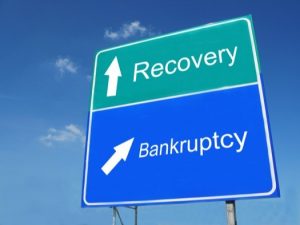 In a recent blog, we wrote about the high cost of Chapter 11 bankruptcy for small and mid-sized companies (SME).
In a recent blog, we wrote about the high cost of Chapter 11 bankruptcy for small and mid-sized companies (SME).
As we talk with owners and managers of troubled companies, we often hear: “If I can’t work things out, I’ll just declare bankruptcy.”
By bankruptcy, they mean Chapter 11, which allows the debtor to reorganize the company by submitting a plan of reorganization that is acceptable to the creditors and approved by the bankruptcy court.
While Chapter 11 reorganization for a smaller or mid-sized company won’t approach the staggering number of a large company, it is still extremely expensive relative to the size of the business.
It’s Very Expensive …
The reason a Chapter 11 bankruptcy is so expensive is because it involves two separate elements:
1. a reorganization plan and
2. a debt repayment plan.
 The reorganization plan has to convince the court and your creditors that the business can make a profit in the near future. This plan must be supported by reliable data.
The reorganization plan has to convince the court and your creditors that the business can make a profit in the near future. This plan must be supported by reliable data.
Then you have to show a budget where you outline how you can repay your creditors over the next several years. And then you will have to negotiate the terms of the plan with the court and your creditors.
While that is going on, your budget has to allow for the payment of your attorney’s fees, your creditors attorney’s fees and for financial advisors on both sides.
Success Rates Are Very Low …
The success rate in Chapter 11 bankruptcies is extremely low, meaning that a very low percentage of reorganization plans actually obtain court approval. Depending on size and financial capability, experts put the number between 20 and 30 percent. Thus there is a high chance that the company will spend a lot of money putting together the plan and attempting to persuade the court, but fail to do so and end up in Chapter 7 liquidation.
 But it appears that help may be on the way. Proposed changes to the Bankruptcy Abuse Prevention and Consumer Protection Act of 2005 (BAPCPA) offer significant help for Small and Mid-Sized Enterprises (SME) seeking protection in Bankruptcy.
But it appears that help may be on the way. Proposed changes to the Bankruptcy Abuse Prevention and Consumer Protection Act of 2005 (BAPCPA) offer significant help for Small and Mid-Sized Enterprises (SME) seeking protection in Bankruptcy.
In the proposed changes, a company is considered an SME if:
1. No publicly traded securities were included in its capital structure or in the capital structure of any affiliated debtor whose cases are being jointly administered with the debtors case.
2. It had less than $10 million in assets or liabilities on a consolidated basis with any debtor or non-debtor affiliate as of the petition date.
3. If a debtor met the above requirements, but had between $10 and $50 million in assets, the company could request that the SME rules apply.
What’s The Advantage?
 So, what is the advantage to the proposed SME rules? An SME would have the opportunity to avoid one of the largest costs of a Chapter 11, namely a committee of creditors along with all of the legal and advisory costs that go along with that.
So, what is the advantage to the proposed SME rules? An SME would have the opportunity to avoid one of the largest costs of a Chapter 11, namely a committee of creditors along with all of the legal and advisory costs that go along with that.
Specifically, unless the court, after a motion from an unsecured creditor that a creditors committee was necessary to protect the interests of unsecured creditors, the default rule for SME’s would be that no creditors committee would be appointed.
A debtor or party in interest could still request the appointment of an estate neutral individual to advise the debtor in possession (DIP) on operation and financial matters and in the negotiation of a plan of reorganization. This individual would be paid by the estate and represent the estate’s interest. This would provide for a much lower cost than the adversarial relationship that exists in the Bankruptcy Code today.
One Of The Most Interesting Aspects …
 One of the most interesting aspects of the proposed changes is the ability for SME equity to retain a substantial stake in the debtor under a plan. The proposal envisions an amendment to the Absolute Priority rule in Section 1129 of the Bankruptcy Code to allow existing equity to maintain 100% voting control of the debtor when it emerges from bankruptcy subject to 85% of the rights to receive economic distributions being vested in creditors.
One of the most interesting aspects of the proposed changes is the ability for SME equity to retain a substantial stake in the debtor under a plan. The proposal envisions an amendment to the Absolute Priority rule in Section 1129 of the Bankruptcy Code to allow existing equity to maintain 100% voting control of the debtor when it emerges from bankruptcy subject to 85% of the rights to receive economic distributions being vested in creditors.
While it is unclear if these proposals will become law in their present form, the intent is to make Chapter 11 less costly and more effective for small to mid-sized companies.
Important To Note That …
It is important to note that even if these changes are accepted, they do not affect secured debt and unsecured creditors can and may object to a plan individually. With enough objections, a plan may not be approved by the court.
Even with reduced costs, bankruptcy remains expensive and it is always beneficial for companies to deal with problems proactively to avoid the expense and risk of the proceedings.
 As this is our last blog of 2015, we thank all of you who read and comment on our writing and want to wish you, family and friends the very best of the Holiday Season.
As this is our last blog of 2015, we thank all of you who read and comment on our writing and want to wish you, family and friends the very best of the Holiday Season.
We look forward to having more to say in the coming year.


